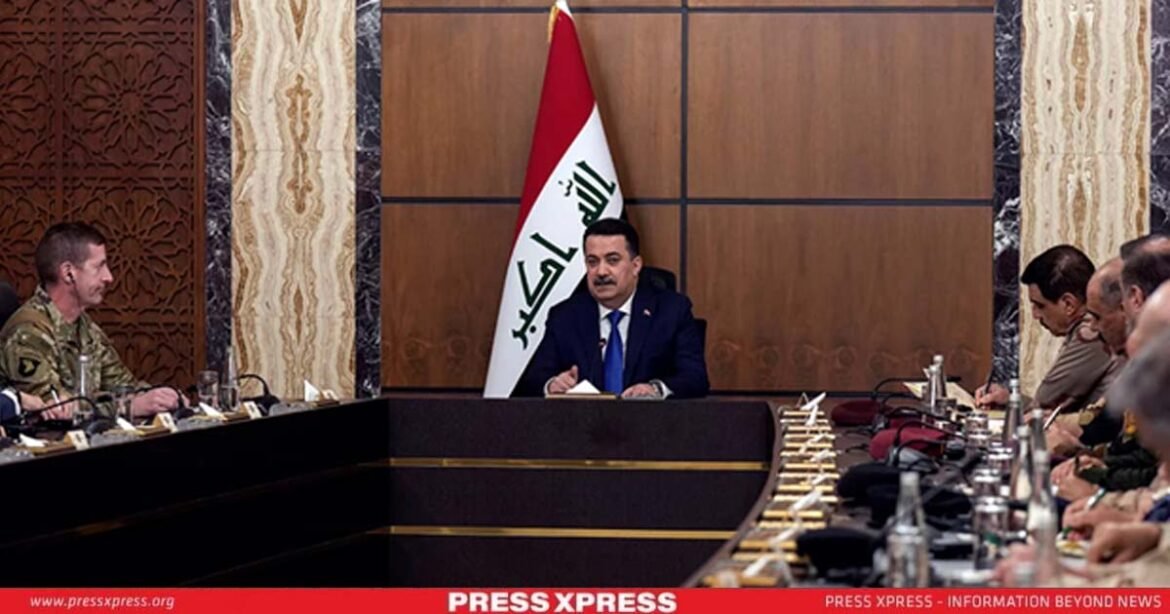Both sides expressed a commitment to constructive engagement and a mutual desire to address the issue of foreign troop presence with transparency and respect for Iraqi sovereignty.
In a significant development, Iraq and the United States held their first round of talks on the future of American and other foreign troops in Iraq, with Baghdad expressing expectations that the discussions would lead to a timeline for reducing their presence. The talks, which began on January 27, were suspended after a drone attack killed three US military personnel in Jordan but were resumed on February 12.
Iraqi Prime Minister Mohamed Shia al-Sudani’s office released a statement, accompanied by a photograph symbolizing unity, featuring the Iraqi leader alongside top-ranking officials from both the Iraqi armed forces and the international coalition formed under Washington’s leadership to combat the Islamic State (IS) jihadist group. This visual representation underscored the gravity of the deliberations underway.
“The talks and whatever progress made will determine the length of these negotiations,” affirmed Farhad Alaaldin, a foreign affairs adviser to Prime Minister Sudani.
Key Players and Expectations
The dialogue, anticipated by many as a significant milestone in shaping Iraq’s security landscape, brought together representatives from both Baghdad and Washington. The Iraqi delegation included senior officials from various government agencies, while the American side was represented by diplomatic and military personnel.
Expectations ran high as the talks commenced, with both sides expressing a commitment to constructive engagement and a mutual desire to address the issue of foreign troop presence with transparency and respect for Iraqi sovereignty. The stakes were particularly high for Iraq, which has long sought greater control over its security affairs while balancing complex regional dynamics.

Balancing Sovereignty and Security
The dialogue unfolded against the backdrop of Iraq’s enduring struggle to assert its sovereignty in the face of foreign intervention and domestic challenges. The presence of American and other foreign troops, initially deployed to combat the threat posed by IS, has remained a contentious issue, fueling calls for their withdrawal from various segments of Iraqi society.
For Washington, the talks represented an opportunity to recalibrate its military presence in Iraq in line with evolving strategic priorities while upholding its commitments to Iraqi security and stability. The Biden administration has signaled a willingness to engage in dialogue with Baghdad to address concerns and explore mutually acceptable solutions.
As the dialogue progresses, all eyes are on the outcome of the deliberations and the prospects for defining a clear timeline for the reduction of foreign military presence in Iraq. While both sides acknowledge the need for continued cooperation in areas such as counterterrorism and training, the question of the extent and duration of foreign troop presence remains a subject of intense scrutiny.

Prime Minister al-Sudani’s government is under pressure to deliver tangible results that reflect Iraqi aspirations for greater autonomy and sovereignty. The success of the dialogue will hinge on the ability of both parties to navigate complex geopolitical realities and strike a balance between security imperatives and respect for Iraqi sovereignty.
The outcome of the dialogue will not only shape the future of American and other foreign troops in Iraq but also have far-reaching implications for the country’s internal dynamics and its relations with neighboring states. Ultimately, the success of the dialogue will be measured by its ability to chart a course towards a more secure and stable Iraq, grounded in principles of mutual respect and cooperation.
Background
The United States and Iraq have been in discussions to end the U.S.-led international military coalition in Iraq and replace it with bilateral relations. The coalition, formed in 2014 to fight the Islamic State group, currently has about 2,500 US troops in Iraq and approximately 900 in Syria.
Clarity on Troop Reduction Timeline
Washington and Baghdad announced their agreement to establish “expert working groups of military and defense professionals” as part of the joint commission set up in collaboration with Baghdad.
These three working groups, according to Sudani’s office, will focus on assessing the level of threat posed by ISIS, addressing operational and environmental requirements, and enhancing the capabilities of the Iraqi security forces.
Iraq’s foreign ministry is aiming to develop “a specific and clear timeline” to initiate the gradual reduction of coalition advisors stationed in Iraq, underscoring the nation’s commitment to assuming greater control over its security affairs.
Challenges Amid Progress
Since mid-October, over 150 attacks targeting coalition troops have occurred, with many attributed to the Islamic Resistance in Iraq, a loose alliance of Iran-linked groups opposing US support for Israel in the Gaza conflict.
Despite the defeat of ISIS in Iraq in late 2017 by Iraqi forces supported by the US-led coalition, jihadist cells continue to pose sporadic threats, highlighting the persistent security challenges in the region.


